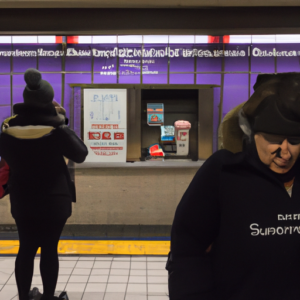The Opioid Crisis in Canada: Focus on Naloxone Nasal Sprays in the TTC
As the country grapples with rising opioid-related deaths, coordinated efforts are necessary to stem the alarming tide. A recent article titled ‘TTC deploying naloxone nasal sprays in new effort to combat opioid crisis‘ points towards decisive action within the public transportation sector that could save lives and help address this urgent public health crisis.
The Opioid Crisis – A Closer Look
The opioid crisis in Canada has hit alarming proportions. Often linked with homelessness and crime, it has reverberated across communities, necessitating urgent and proactive action. One of the primary causal factors lies in the misuse of opioids, a class of drugs that includes illegal drugs, such as heroin, and prescribed pain relievers, such as oxycodone and fentanyl. Its highly addictive nature has led to misuse and, in many cases, eventual overdose deaths.
TTC’s Initiative to Combat the Opioid Crisis
In a ground-breaking move, the Toronto Transit Commission (TTC) is deploying naloxone nasal sprays in a bid to combat the crisis. Naloxone is a life-saving drug that can reverse an opioid overdose by blocking the effects of opioids. Making these sprays accessible across its extensive network, the TTC hopes to empower its staff to respond effectively to overdose situations.
The Naloxone Deployment Scheme
Initially, the TTC plans to place naloxone kits in staff-designated areas in the subway system, where accessibility to emergency medical services could be delayed. Additionally, TTC special constables will carry naloxone kits, equipping critical personnel on the frontline to fight this crisis effectively.
The Impact of TTC’s Naloxone Initiative
This initiative by the TTC could be a potential game-changer in combating the opioid crisis in urban spaces. Its widespread reach and accessibility can aid timely administration of naloxone in crucial, life-saving circumstances. Moreover, it signals an important move towards a preventive role for public institutions in tackling the crisis.
Key Features of the TTC’s Initiative
- Life-saving naloxone kits will be available in the Toronto subway system.
- TTC special constables will be equipped with naloxone, enhancing their response capabilities to opioid-related emergencies.
- An emphasis on a proactive, preventive role in combatting the ongoing crisis.
Challenges and Way Forward
While the TTC’s initiative is commendable, tackling the opioid crisis requires a multifaceted approach. A critical component is addressing underlying issues like poverty, homelessness, and lack of mental health services- factors that contribute to individuals falling prey to opioid addiction. Moreover, adequate training for TTC staff and public awareness regarding the use of naloxone sprays are essential for the effective implementation of the initiative.
Opioid Class Action in Progress
Simultaneously, more substantial measures like the current opioid class action lawsuits against opioid manufacturers and distributors should progress towards holding these companies accountable for their role in fuelling the crisis. Such combined efforts, spanning preventive, legislative and punitive measures, can help turn the tide against the Canadian opioid crisis.
In Conclusion
The opioid crisis in Canada is an urgent public health issue warranting decisive, comprehensive action. TTC’s naloxone initiative is a shining example of how public institutions can play a proactive role in combating the crisis. Coupled with measures to tackle underlying societal issues and holding responsible parties accountable through opioid class action suits, we can take strides towards overcoming this crisis. The TTC’s move is a crucial reminder that solving the opioid crisis is a collective responsibility, where every action matters.
